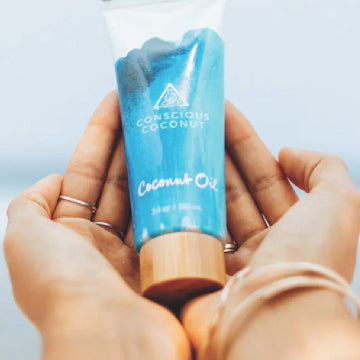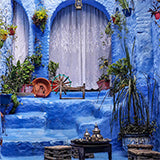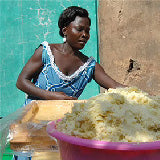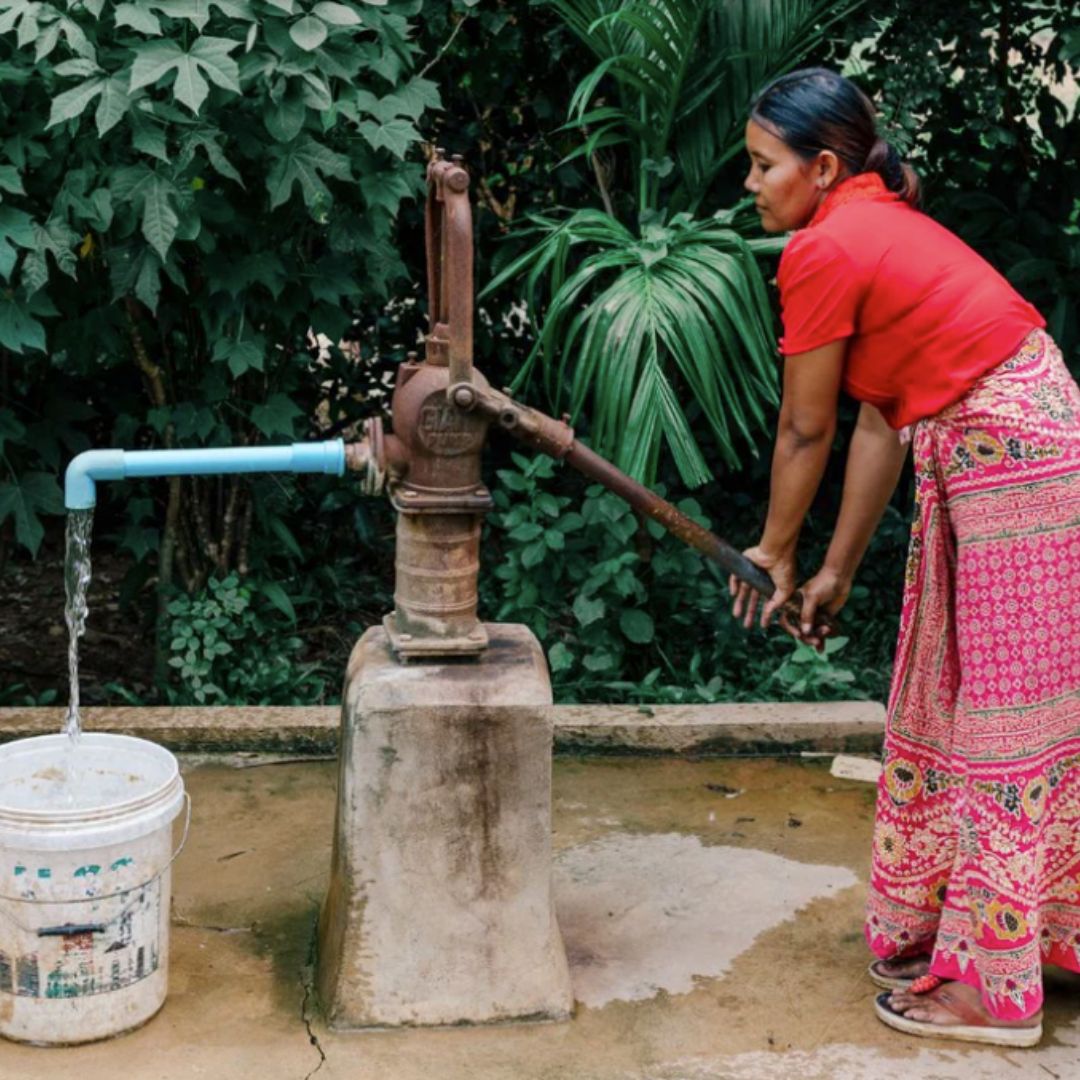Meet the Makers of Your Beauty Products

There are so many reasons to celebrate October. The turning of the leaves, Halloween, Diwali - the Hindu Festival of Lights, and of course, National Fair Trade Month, a time to shed light on the importance of fair trade in our global economy and promote buying from businesses that follow fair trade practices.
While beauty products may not be the first thing that comes to mind when thinking about fair trade (most people think of coffee or bananas, so it's OK (!), beauty products actually can benefit quite a bit from fair trade practices and Fair Trade Certifications.
Along with the science that goes into beauty product formulation, natural resources such as shea butter, cacao, and argan oil (to name a few) play a big part in our favorite body creams, lipsticks, and face serums. These indigenous resources are derived from countries around the world where farmers and producers make a livelihood working to extract these ingredients for the purpose of incorporating them into the very products we use every day.
That's where fair trade comes into play. Fair Trade certifications by third-party certifiers like Fair Trade USA, (there are many around the world, but they're one example), create rigorous standards that protect farmers, producer communities, and the environment.
They help guarantee these communities are paid fairly and consistently, ensure safe working conditions, eliminate forced and child labor, and create environmental protections.
When you purchase beauty products formulated with Fair Trade-certified ingredients, you're helping to improve lives and protect the planet.
At Beautyologie, we make these beauty brands easily accessible to you by curating them all in one marketplace. For more information on how some of our partners are making a difference around the world, please keep reading.

Situated in Guatemala, Tierra & Lava believes you shouldn’t have to compromise with natural skincare - you can have a product that is both kind to your skin and the earth. The company sources its ingredients ethically and transparently.
Tierra & Lava's founder, Lucy Ashman, develops relationships with farmers and financially supports them to preserve vanishing traditions. They grow many of their ingredients in their very own organic garden, ensuring the utmost quality. Due to their connection to the ingredients they use, they work to preserve their natural integrity.
Meet Artisan Beeswax and Honey Farmers - Don Rafa and Don Eduardo
Don Rafa is a neighbor to Tierra & Lava in Guatemala, and comes from many generations of beekeeping. He began his practice at age 11, and is now working in a sustainable lifestyle as a beekeeper. He spends most of his earnings on his children’s school books and transportation to and from the rural mountaintop where Tierra & Lava is produced.

Don Eduardo wanted to study medicine, but sadly, his family could not afford his education. He left his village to work in the city, but later returned to care for his aging parents. Don Eduardo was able to make a sustainable, fair wage in beekeeping, and pay for his daughter’s education. One daughter became a social worker, and the other a law student!
Don Eduardo learned the art of beekeeping from Don Rafa, which proved to be an ideal business requiring very little investment or employees. He works with 18 hives deep in the mountain, unspoiled by any kind of human pollution. He loves the patience and experience beekeeping requires.

Don Eduardo and Don Rafa’s honey is extracted via air pressure, thus preserving all nutrients and medicinal qualities. It is a vitamin A rich beeswax that has a natural moisture seal that protects your skin and hair, and promotes cell regeneration. The signature fragrance that comes from the honey is from Tailipon blossoms, and the characteristic greenish tint comes from the Cajete blossoms.
Meet Don Max - Sacred Mayan Black Salt Extractor
The art of extracting the Mayan black salt is a sacred tradition that is sadly being forgotten by the younger generations. Don Max is one of the few people in his village that is still practicing this sacred Mayan process.

What used to be a thriving industry that drew national tourists for the medicinal uses and distinct flavor, is now sold by the pound on the side of the road in town. The younger generation has found a way to produce the salt with less effort and at a higher salary, therefore, they are not interested in following the sacred, tedious family tradition of extracting the salt.

Don Max learned the sacred tradition from generations before him, and the house he prepares the salt in has been used as long as he and his mother can remember. The soil used to spread over the salt flats has been recycled over years and years.

The heat of the sun creates a special soil on the salt flat, and the salt itself is drawn up into the top layer. Don Max then collects and passes the salt through his filter to extract only the saline. He then prepares for the 10 hour cooking session where the water is evaporated over a wood fire in little clay pots that Don has made himself. Don tends to the fire and pots throughout the entire 10 hours, until they are full of solid black salt.
The art of extracting the sacred Mayan black salt is very tedious, but it gives Don Max pleasure and satisfaction to be carrying on the tradition and knowledge of this sacred mayan process.
Meet Dominga Bo - Wild-harvesting Copal
Copal is traditionally used in Guatemala by the Mayan people for burning during sacred ceremonies and is believed to purify the air and spirit. Copal is a tree resin similar to amber with a smoky, sweet aroma.

Dominga Bo works in the Guatemalan village of Uaxactun, neighboring the ancient Mayan city Tikal. The main source of income in this village is harvesting Xate (palm tree leaves) which pays $8 per day, while wild-harvesting copal from trees pays almost double!
Tierra & Lava is working to increase the demand for this powerful ingredient, as there is the capacity and resources to scale copal harvests by more than 100 times, providing more Uaxactun women with work and raising their income by 90%!

Terres D'Afrique is a certified organic and fair trade product that belongs to the Southern African Natural Products Trade Association. Sourced from ethically sourced African botanicals.
A pure luxury unisex skincare with a special focus on both science and nature. Stephan Helary is a native of Madagascar, where he discovered his passion for agriculture, botany, conservation, and ecology.
Terras D'Afrique focuses on ethical biotrade, benefiting harvesters, respecting their intellectual property, and conserving ecosystems. By harvesting practices that honor and protect natural ecosystems, the brand is also committed to ensuring a future for these indigenous plants and the communities who live alongside them.
Women in rural villages are often juggling being the farmer, as well as the primary caregiver for their children. The women’s farming work takes them away from their villages, which is not practical or safe for their young children to accompany them. Informal pre-schools have developed to fill this need, but they are not adequate solutions.

Terres d’Afrique donates 1% of its sales to the Baobab Foundation, which supports projects in Baobab harvesting communities. This foundation is building a pre-school in the Dambale Village, which provides Terres d’Afrique with Baobab for their products.
Meet Sophie Thandavhatha - Baobab Harvester
Sophie is a baobab harvester in the Muswodi Dipeni Village in the Limpopo Province of South Africa.

“I have seven children. When I started to sell Baobab fruit, I didn’t have plates and knives and forks in my home. That’s what I used the first money for. After that I could buy school uniforms for my children. After a while my children got older. And I could pay the fees for my first born to study catering. Another child needed to get a driver's license and the money from my Baobab sales paid for the driving school.”
“The oldest one is now working in a catering job. And my child with the driver's license is working in a shop and wants to continue his studies. So when the Baobab fruits come again, I will be saving to pay for his further education to become a paramedic.”
“Every time the Baobab time comes, we can buy those things we could never have before. All problems are so much smaller when you have the joy of working.”
Meet Selina Ndlovu - Baobab Harvester
Selina Ndlovu is a baobab harvester from Muswodi Dipeni village in the Limpopo Province in South Africa.

“I have lived in this village since I was ten. I got married here, I had my children here, and I will grow old here. I have been collecting Baobab fruit for some time now. First I used the money for food, for buying clothes, blankets, for many different things.”
“Later I went and bought wire and fencing poles and I fenced my fields with that. Buying the fencing for my field helped me a lot. When it is raining I plant millet and sorghum, and also in another season I plant watermelon and squashes. It’s really good, the fencing, otherwise the cows and goats eat my crops.”
“With the money I got this year I bought more fencing, and I am just waiting for the next Baobab season so that I can employ someone to fence an even bigger field for me. The one that I use is a bit too small for me as my farming business is growing. I am now like the Baobab – bringing a new harvest every year.”
Meet Annah Mendela - Baobab Harvester
Annah Mendela is a Venda woman from the village of Muswodi Dipeni in the province of Limpopo in South Africa. She is a baobab harvester, and is wearing the traditional Venda dress.

Meet Khelina Magagula - Marula Harvester
“Because of all the things I have learned selling Marula Kernels, I now think of myself as a business woman.”

Meet Venda Community - Baobab Harvester
Venda Community from Limpopo in South Africa, says, “ knowing that other people in parts of the world are using my baobab makes me very proud.”


Shea Yeleen is dedicated to empowering women in West Africa and the United States through the production, sale, and use of shea butter products. A unique blend of grassroots organizing and business development, Shea Yeleen is a company that specializes in manufacturing high-quality, pure plant-based shea butter products with a commitment to ethical sourcing.
Shea Yeleen currently offers its female producers five times Ghana's minimum wage while providing access to health insurance. Its business model has a direct and regenerative community impact that allows the ongoing education of more than 268 children.
Meet Gladys - Shea Butter Producer

Through her work in the shea butter cooperative in Damongo, Ghana, Gladys, a married woman of four, has been paying for her kids' school fees, health insurance and utility bills. She was also able to fund her dream of opening a small café with her Shea Yeleen income.
-
Posted in
cacao, Fair trade beauty, fair trade makers, fair trade month, marula oil, Shea Butter














